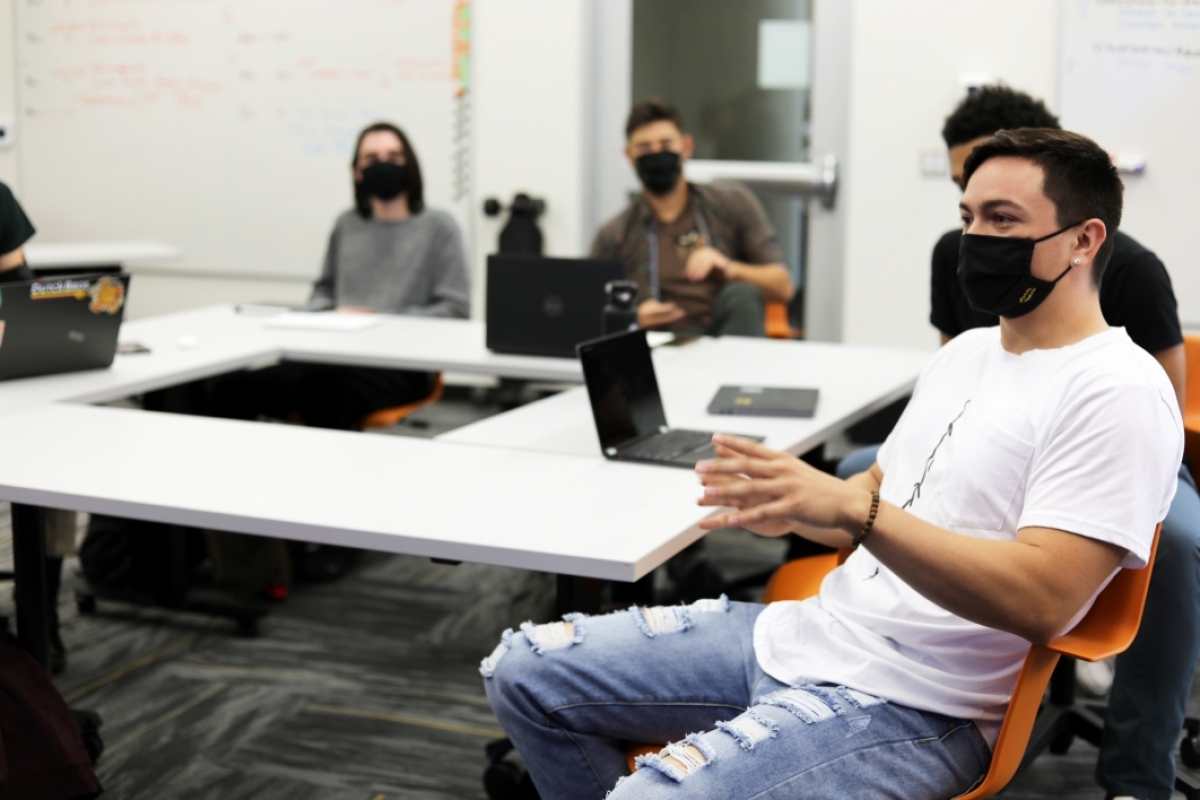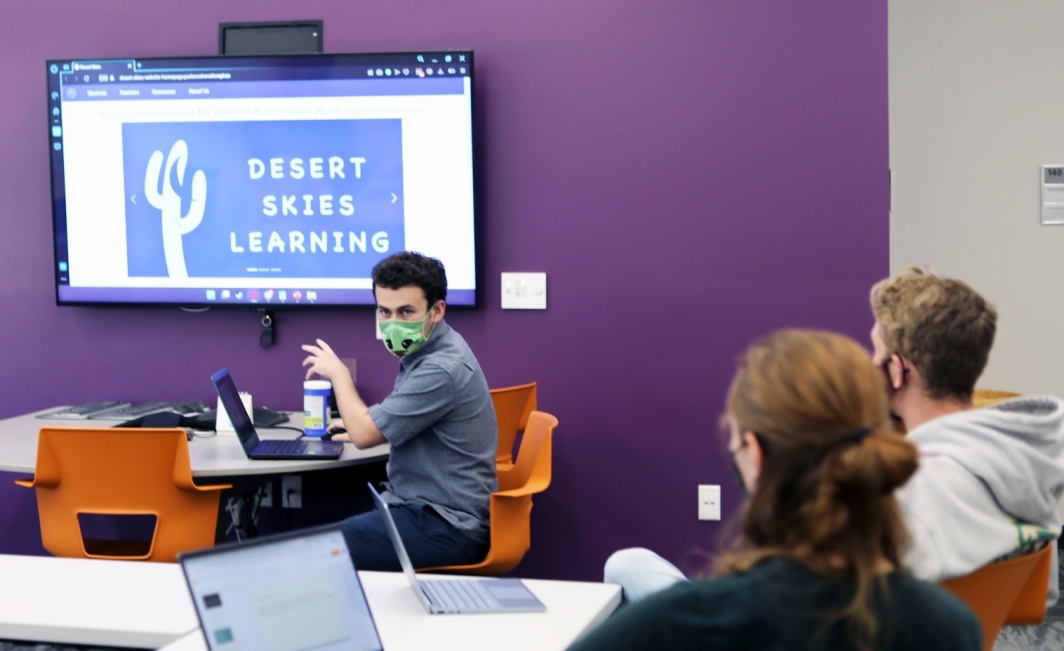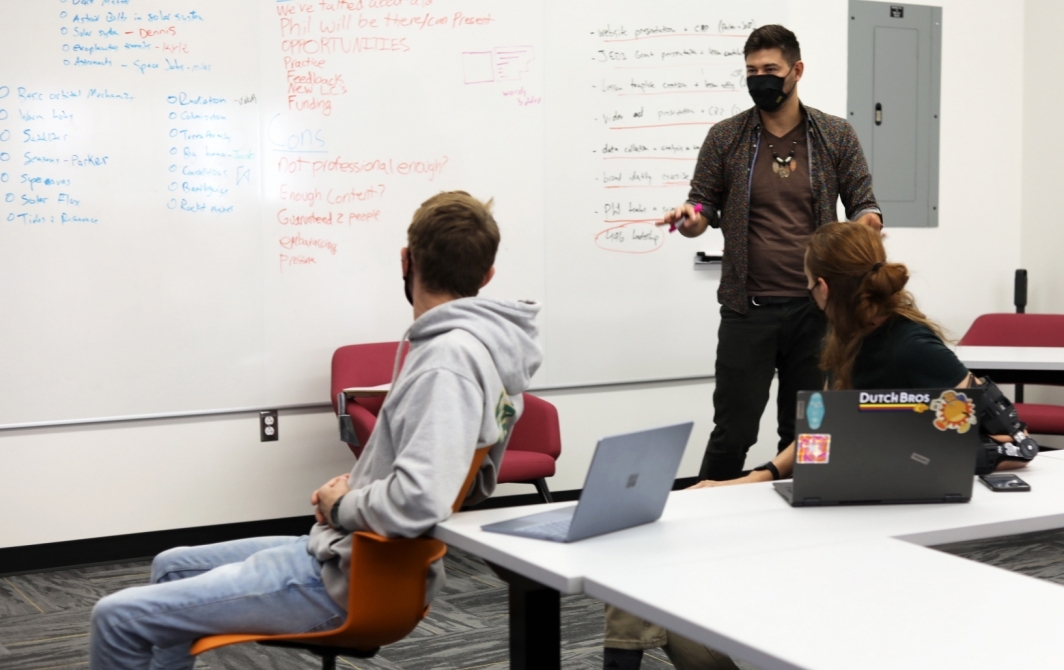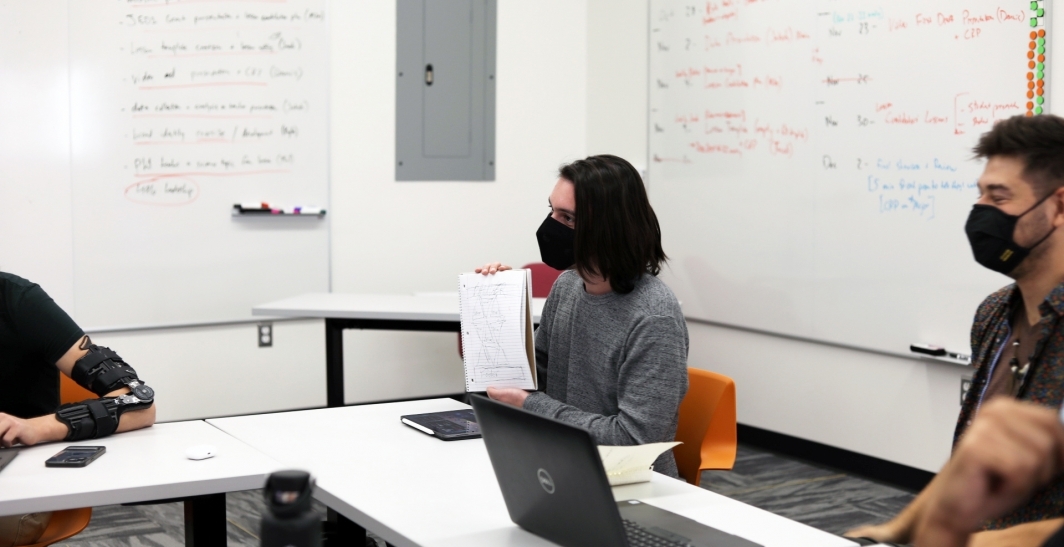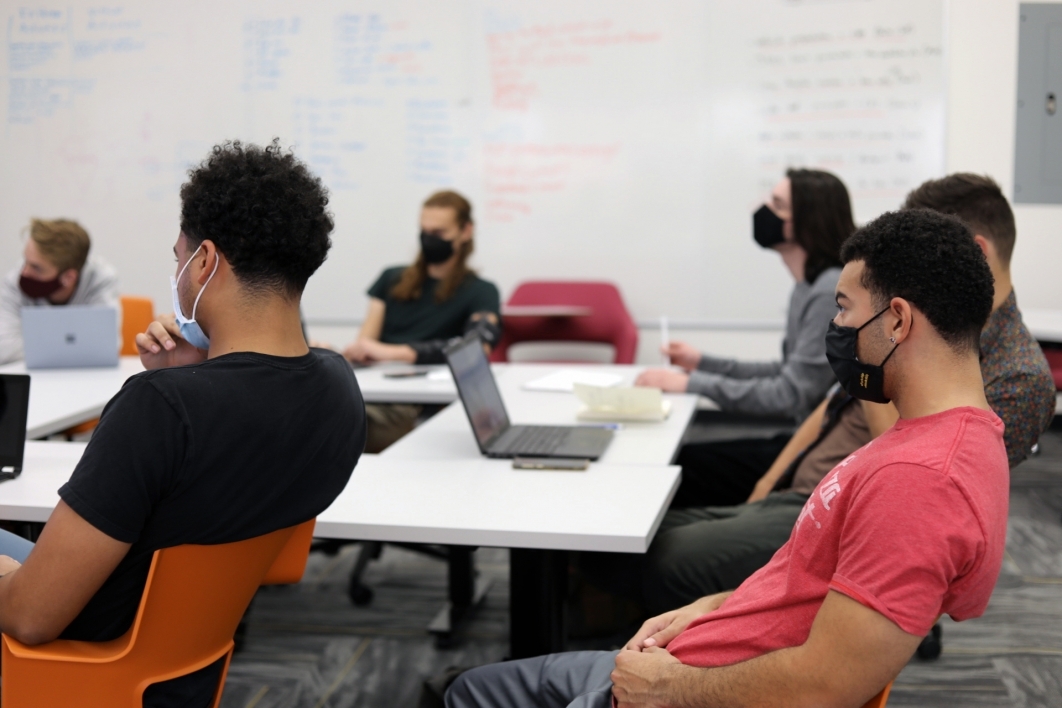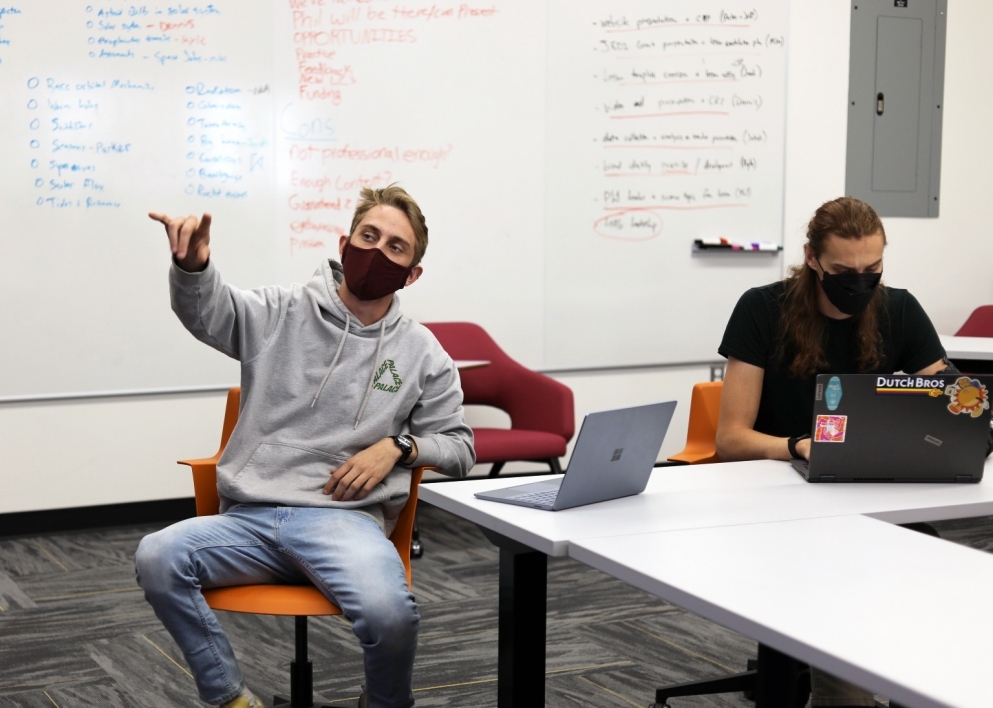Technological leadership degree centers on student agency in the classroom
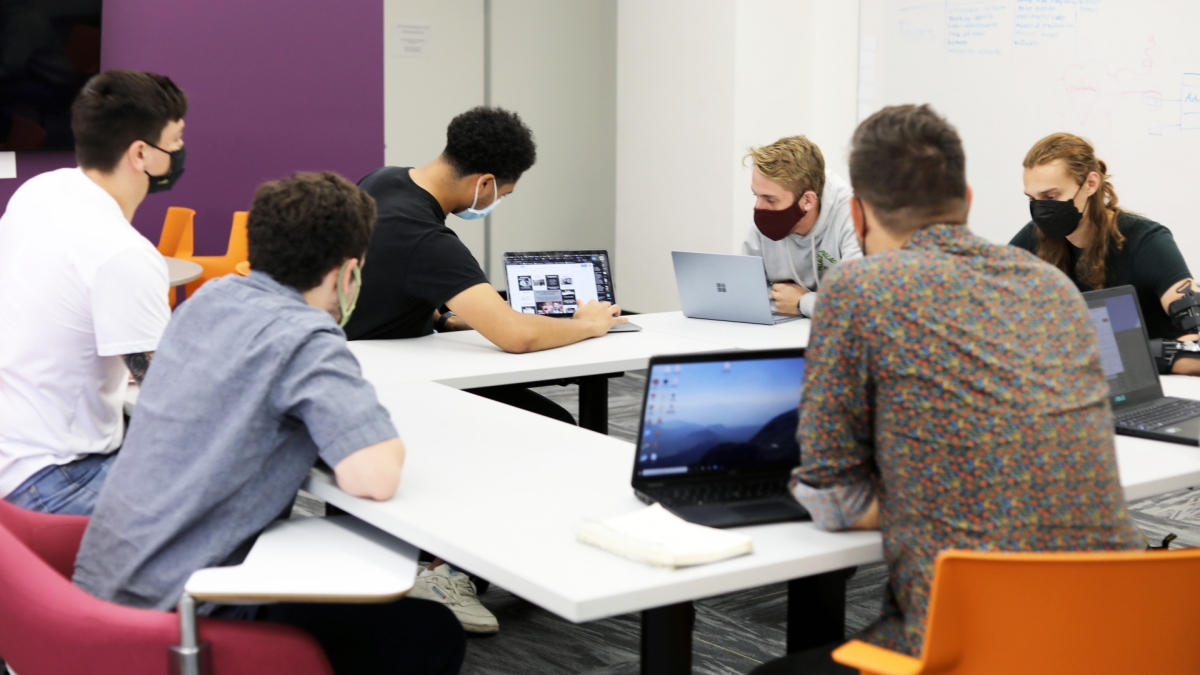
Classmates engage with a student presenter in the Creative Futures Studio class.
The Interplanetary Initiative’s bachelor’s degree in technological leadership is giving Arizona State University students the chance to learn in a new way and graduate from ASU equipped to enter a wide array of science and technology fields.
“I feel very prepared because what I’m learning can be applied in the future very easily to anything in the aerospace industry, whether it’s developing technologies or leading a group to help develop technologies. I feel like I can fit into any form of the aerospace industry really well because of this major,” said Jacob Leach, a technological leadership student aspiring to work in the aerospace sector.
The degree is designed to teach students key skills in interdisciplinary research, technology design and collaborative leadership through a blend of learner-centered coursework and hands-on projects. As a result, the degree can be used to enter a variety of fields such as technology, green energy, aerospace, health care, manufacturing, telecommunications, education and more.
“We're training students to think analytically, work collaboratively, communicate compellingly and learn continuously. These are the important skills that all of us need in order to answer today and tomorrow's most pressing questions in the fields of science and technology,” said Interplanetary Initiative Director of Learning Katherine McConachie.
Creative Futures Studio is one of the hands-on, project-based courses available to technological leadership students. Students in this course are challenged to work collaboratively to develop creative ventures of their own design. This semester, several students are working to build a STEM education resource website with lessons on subjects like planetary science, astrophysics and space futures. They began working on their project last semester, when three students came up with the idea.
“In our experience, when we were in classrooms in high school and elementary school, we felt like they didn’t really explain very much of that to us and we wanted to get the chance to explain that in greater detail and allow more students to get excited about the STEM field and hopefully follow careers based on that,” said Parker Cohensitt, a technological leadership student in his final semester.
Those three students joined with four more this semester, and the group is now full steam ahead with development. They are managing the project in four subteams: web design and development; curating and creating lessons; teacher outreach and partnerships; and branding and marketing. The project will eventually become a website called Desert Skies. It serves as an opportunity for the technological leadership students to learn collaboration and leadership skills, as well as practical skills in website design and science communication, all as part of a project that students are driving forward themselves.
During the class, students take turns presenting updates on their progress. One of the student presenters led the group in a brainstorming exercise to come up with lesson ideas for two different age groups in the virtual and in-person formats. Another student took ASU’s commitment to innovation to heart and suggested the game "Angry Birds" as a method to teach young students the principles of orbital physics.
During this time, Instructor Phil Stoesz acted as a participant in the class, stepping back to allow the students to take the lead. The presentations were not meant to just update classmates on progress, but also to give the student presenters the opportunity to practice leading and facilitating collaboration. Following each student presentation, the class engaged in a four-step critique. Stoesz is a certified critical response process facilitator, and he uses his classroom as an opportunity to train his students in the method. In Step 1, the class comments on aspects that were unique or worked well. In Step 2, the presenter asks the class questions about how they did. In Step 3, the class asks questions of the presenter, and in Step 4, the class gives permissioned opinions to the presenter.
“It helps them talk about what’s meaningful about the work they’re doing. It helps them get curious about the work and how to improve it. And it helps them share opinions in a rigorous way that is also safe and professional,” Stoesz said.
The agency students are encouraged to take in this class is a theme that was echoed by students about many of their technological leadership classes.
“That’s the best part of this major, that you kind of get to pick which route you want to take. I know people in this class are more focused on web development in their future. I myself am more focused towards the project management side of this major — so, taking this and trying to do grant discovery work or government work for project management,” said senior technological leadership major Miles English.
Leach agreed, adding, “All TL (technological leadership) classes have some form of hands-on education where you learn it yourself and you’re doing it yourself and you have something you can take pride in.”
Technological leadership students are given the opportunity to learn differently, and it’s what they value in their education.
“Our exams are ‘prove you’ve learned something over the last six weeks.’ I don’t have to study and learn the exact same things everybody else does and then immediately forget about it after the fact. I will forever remember every single one of my Interplanetary Initiative classes. I will forever remember Desert Skies because of how much we’ve done with it, how much I’ve learned from it, how much I’ve grown because of it,” said Leach.
“One of the things students will often tell me is they look forward to the class because they have a lot of power to do what they want. And also it’s the closest thing to what they’ll be doing for the rest of their life, which is working together, figuring out how to collaborate, how to be part of a team, being clear with each other and leading. It’s all the actual skills that they will need and use in the rest of their lives,” Stoesz said.
HDA 296: Creative Futures Studio will be offered online and on-ground in spring 2022, and students from all majors are welcome and encouraged to register. For questions about this course or the technological leadership bachelor's degree, please email TechLeadership@asu.edu.
More Science and technology
2 ASU faculty elected as fellows to National Academy of Inventors
Arizona State University faculty members Bertram Jacobs and Klaus Lackner have been elected as fellows to the National…

Harvesting satellite insights for Maui County farmers
Food sovereignty can refer to having access to culturally significant foods, but Noa Kekuewa Lincoln believes it goes farther…

Google grant creates AI research paths for underserved students
Top tech companies like Google say they are eager to encourage women and members of historically underrepresented groups to…
